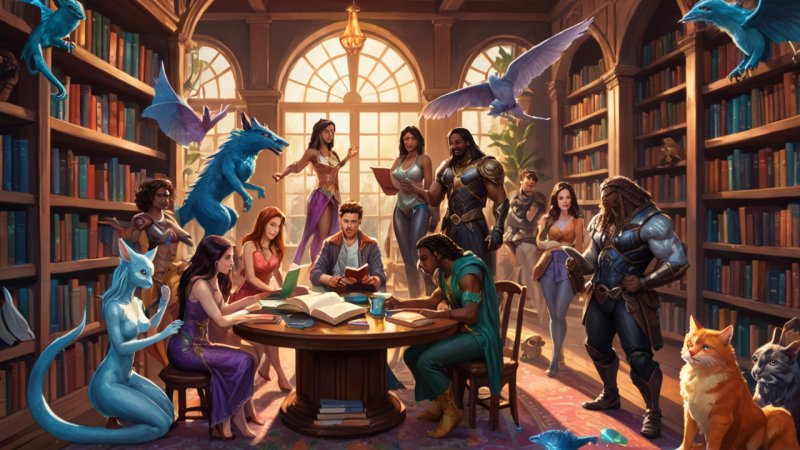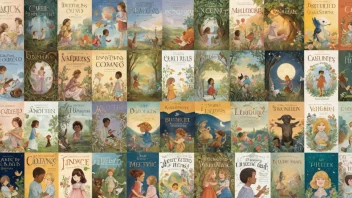In recent years, fan fiction has emerged as a powerful force within the literary landscape, particularly in the realm of fantasy literature. What began as a niche hobby for dedicated fans of various franchises has evolved into a vibrant community of writers and readers who explore and expand upon their favorite narratives. This article delves into the multifaceted impact of fan fiction on fantasy literature, examining its role in shaping narratives, enhancing character development, and fostering communities of passionate readers and writers.
Understanding Fan Fiction
Fan fiction is a genre of writing that allows fans to create their own stories based on existing works of fiction, including books, movies, TV shows, and video games. These stories often feature established characters and settings, but fan fiction writers use their creativity to explore alternative plotlines, character relationships, and even entire universes. The rise of the internet has facilitated the growth of fan fiction, allowing writers to share their work widely and connect with like-minded individuals.
The Evolution of Fan Fiction
Historically, fan fiction dates back to the early days of literature, with examples found in the works of authors like Jane Austen and Sir Arthur Conan Doyle. However, it gained significant traction with the advent of the internet in the late 1990s and early 2000s. Platforms like FanFiction.net and Archive of Our Own (AO3) created spaces where fans could publish their stories, leading to a surge in both readership and writing. This evolution has not only democratized storytelling but has also allowed for the exploration of diverse voices and perspectives that may be underrepresented in traditional publishing.
Fan Fiction's Influence on Fantasy Literature
The impact of fan fiction on fantasy literature can be observed in several key areas:
1. Expanding Narrative Possibilities
One of the most significant contributions of fan fiction is its ability to expand the narrative possibilities of established works. By exploring alternate universes (AUs), fan fiction allows writers to reimagine beloved stories. For example, a writer might create a story set in a contemporary world where characters from a medieval fantasy are transported into modern-day society. This not only provides fresh perspectives on familiar narratives but also invites readers to engage with the source material in new and exciting ways.
2. Character Development and Exploration
Fan fiction often excels in delving deeper into character development. Writers can take secondary characters or those with ambiguous backgrounds and flesh them out through their own interpretations. This exploration can lead to a more nuanced understanding of the characters, as fan fiction writers may address motivations, relationships, and conflicts that the original work only hints at. For instance, a fan fiction piece might explore the backstory of a minor character, shedding light on their actions and choices within the original narrative.
3. Challenging Traditional Tropes
Fantasy literature has its fair share of tropes, some of which have become clichéd over time. Fan fiction often challenges these conventions by subverting expectations. For example, a common trope in fantasy is the “chosen one” narrative. Fan fiction writers may create stories where the chosen one is not the hero, or where the burden of being the chosen one is examined in a more critical light. This creative freedom allows for innovative storytelling that resonates with contemporary audiences.
4. Community Building and Fandom
Fan fiction has played a crucial role in building communities around fantasy literature. Online platforms enable fans to connect, share their work, and engage in discussions about their favorite series. These communities often foster collaboration, with writers and readers providing feedback and support for one another. Additionally, fan conventions and events have sprung up, creating spaces for fans to meet, celebrate their shared passions, and discuss the impact of fan fiction on the broader literary landscape.
5. Blurring the Lines Between Professional and Amateur Writing
The rise of fan fiction has blurred the lines between professional and amateur writing. Many fan fiction writers have gone on to publish their original works, drawing from the skills and experiences gained through their fan fiction endeavors. This transition highlights the value of fan fiction as a legitimate form of creative expression, one that can lead to successful careers in writing. Authors such as E.L. James, who began with Twilight fan fiction, have demonstrated that the skills honed in fan fiction can translate to mainstream publishing.
The Legal and Ethical Implications of Fan Fiction
While fan fiction has had a significant impact on literature, it is not without its controversies. The legality of fan fiction often hinges on copyright issues, as writers use characters and worlds created by others. The response from original creators varies widely, with some embracing fan fiction as a form of flattery and others pursuing legal action against it. The ethical considerations surrounding fan fiction also raise questions about ownership and creative rights, prompting ongoing discussions within both literary and legal circles.
1. Copyright and Fair Use
The legal landscape surrounding fan fiction is complex, often falling under the categories of copyright and fair use. Many fan fiction writers argue that their work constitutes fair use, as it is transformative and does not seek to profit from the original material. However, this is not a universally accepted view, and some authors and publishers actively oppose fan fiction, fearing that it undermines their intellectual property rights. The tension between creators and fans regarding these issues continues to shape the future of fan fiction.
2. The Role of Consent
Another ethical consideration in fan fiction is the issue of consent. While many authors appreciate and support fan fiction, others may feel uncomfortable with how their characters and stories are interpreted. This raises questions about the responsibility of writers to respect the original creator’s intentions while still exploring their own creative expressions. The conversation surrounding consent in fan fiction is ongoing, as writers navigate the delicate balance between inspiration and appropriation.
Conclusion
In conclusion, fan fiction has made a remarkable impact on fantasy literature, enriching narratives, expanding character development, and fostering vibrant communities of readers and writers. As fan fiction continues to evolve, it challenges traditional publishing norms and invites new voices into the literary conversation. While legal and ethical considerations remain complex, the creativity and passion that fan fiction inspires cannot be overlooked. Ultimately, fan fiction serves as a testament to the enduring love of storytelling, demonstrating that literature is not confined to its original boundaries but is a living, breathing entity that thrives on exploration and reinterpretation.






